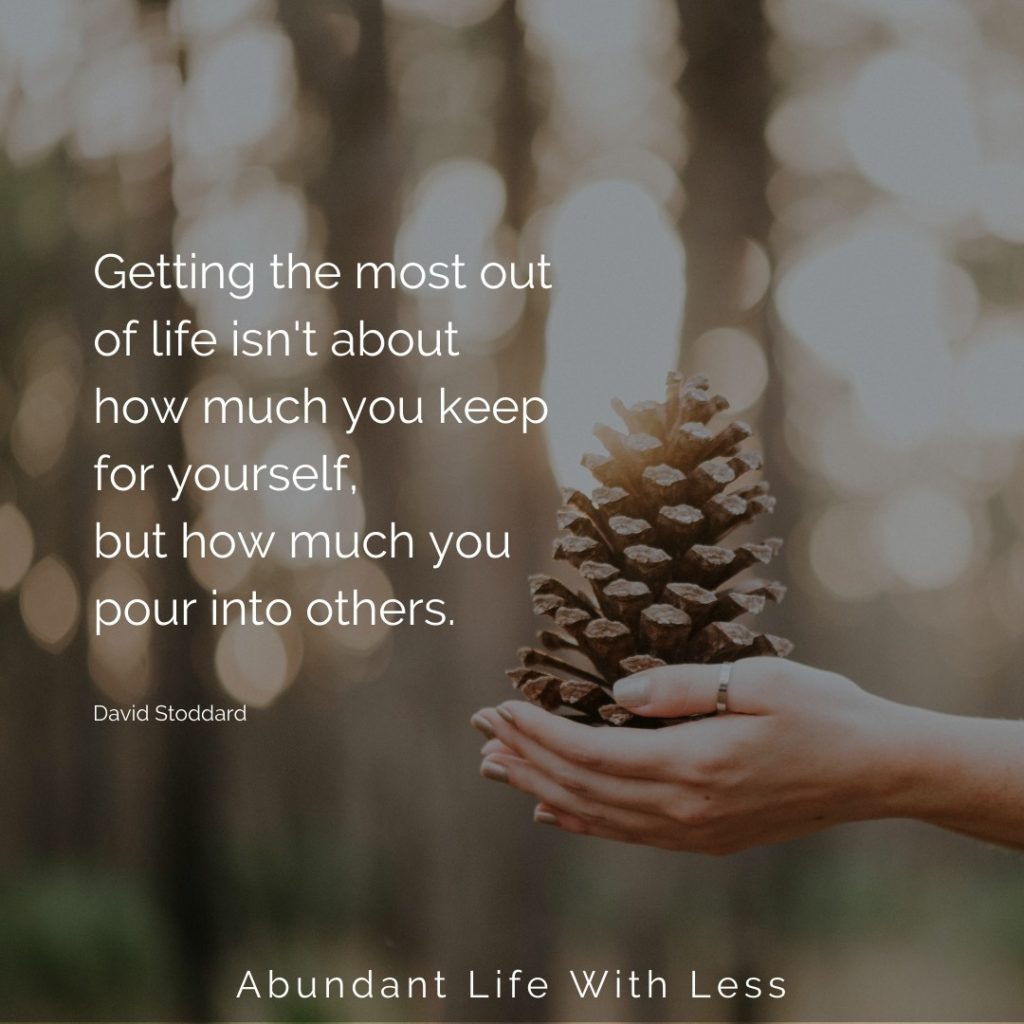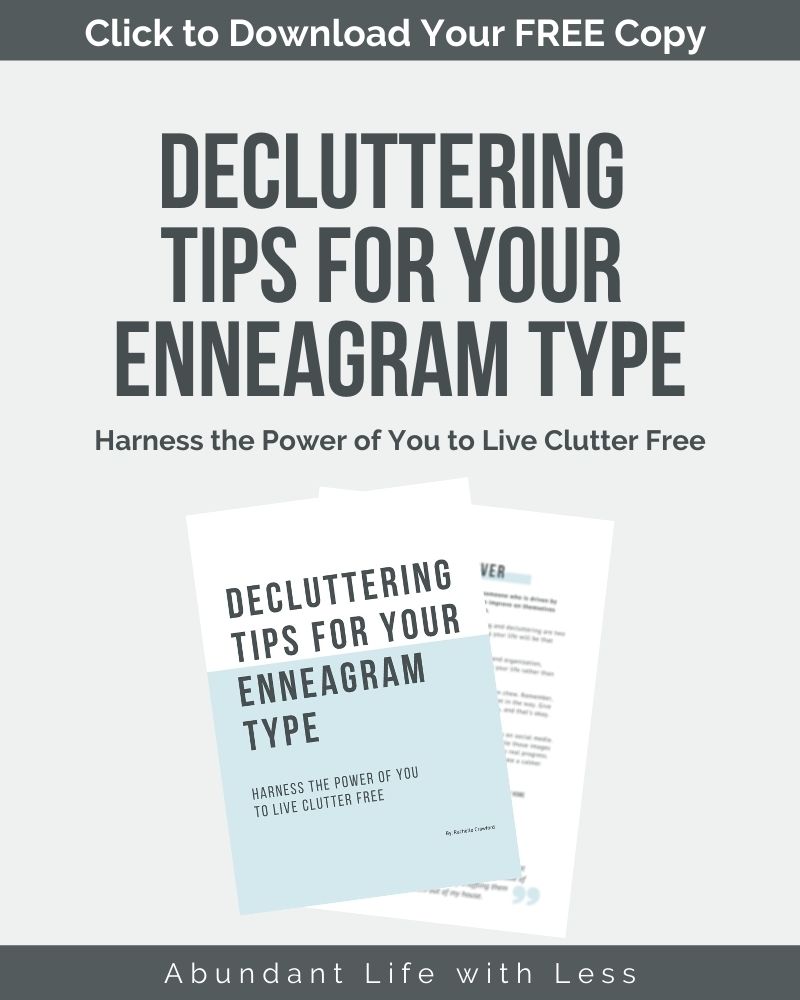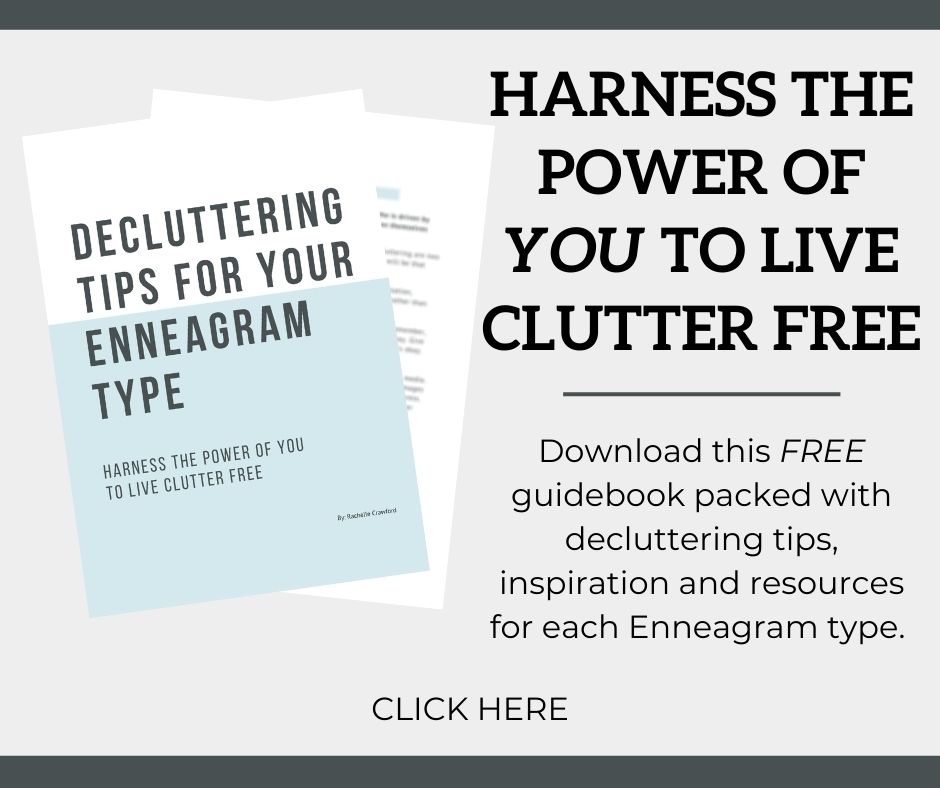
Have you ever wondered why decluttering seems easier for some than it does for others? Why is it that some people seem to let go of their grandmother’s china with ease, while another will dry heave at the very thought of being so cold hearted and wasteful? Why do some people take to minimalism instantly while others struggle to get started or stay motivated? These are questions I’ve been asking since my early days of becoming a minimalist. I know, nerd.
We are all wired differently when it comes to things like love languages, communication techniques, and problem solving, it only makes sense the way in which we approach our material possessions would be unique as well.
I’ve been studying both minimalism and the enneagram for a while now- and by studying I mean more of a “self study” consisting of experience, podcasts, books and conversations over dinner. Next to minimalism, the Enneagram just may be my favorite topic of conversation.
The Enneagram, for those of you who’ve never heard of it, is a personality typing comprised of nine separate personalities. I’ve taken a number of personality tests like Myers-Briggs, StrengthsFinder, and which Disney princess I’d be, the Enneagram however, is by far my favorite. Why? Because it doesn’t focus on our behaviors or the decisions we make, but rather why we make them. It identifies our motivation, needs and desires behind the decisions we make.
The more I’ve learned about my own Enneagram type, which is a Six, the more I’ve come to appreciate how I approach the world. I’ve learned that some of the characteristics I once thought to be weaknesses, are actually some of my greatest strengths.
Our individual personalities greatly impact the way in which we approach everything from faith and work, to relationships, parenting, and even clearing the clutter.
When we look at becoming a minimalist through the lens of our Enneagram typings, our struggles, strengths, and consistent hang-ups make more sense. There really are people more naturally inclined toward minimalism, as well as people more tempted by impulse shopping, and others who struggle to find the motivation more than everyone else.
This isn’t to say that certain Enneagram types can’t become minimalists. However, understanding your Enneagram number will equip you to use your strengths to get uncluttered as well as identify areas that may take a bit more effort and intentionality to move through.

Let’s take a brief look at the decluttering strengths and weaknesses of each Enneagram type. Keep in mind that this is a broad generalization of the most common personality characteristics. If you dive deeper into the Enneagram, you’ll learn that each type also has wings and subtypes which can also impact why and how you respond to the world. This article is just a starting point to help you begin to understand the Enneagram and how your personality may be keeping you cluttered.
How Understanding Your Enneagram Number Can Help You Live Clutter Free
Enneagram Type 1: The Improver
The improver is someone who is driven by a strong desire to be balanced, organized, and to improve themselves and the world around them.
Decluttering Strengths:
Keeping their space in order is important to a One. They love systems and tend to be more naturally organized and tidy people.
It’s easy for a One to get lost in the land of organization, spending lots of time sorting and organizing their excess material possessions into beautifully color coordinated bins. However, once they realize the secret to better organization is actually found in having fewer things to organize, decluttering the excess will become the obvious solution. Ones tend to be more focused and will make becoming a minimalist look easy.
Decluttering Weaknesses:
That said, a One’s struggle with perfection can cause them to overcomplicate the decluttering process. They have a tendency to create unrealistic expectations for themselves and their family. It’s easy for a One to get hung up on how their minimalism looks on the outside, forgetting it’s about so much more than curating a picture perfect space.
Ones love a good plan or method, which can lead them down a rabbit hole of over researching the perfect way to declutter their space. This can even leave them stuck before they ever even get started. If they can’t declutter perfectly, they won’t do it at all.
Enneagram Type 2: The Helper
Twos are driven by a desire to be needed while avoiding acknowledging their own needs. They are energized by helping people and causes they believe in.
Decluttering Strengths:
Twos are a generous group of people. They become excellent declutterers when they lean into that generosity. Letting go is about giving your extra stuff a new life and an opportunity to help someone else who really needs it.
If they are decluttering with a family in tow, they will tend to be more patient with the slower pace of their kids and spouse than some of the other Enneagram types.
Decluttering Weaknesses:
That said, Twos can struggle to prioritize themselves. They often put everyone’s needs above their own, leaving them no time or energy for projects such as decluttering their basements. A Two would find joy in helping a friend declutter, but struggle to feel like they have the time to declutter their own home. Twos struggle to say “no” and have a tendency to overcommit. They often have a stronger sentimental side, which can be especially problematic when decluttering gifts and items of sentiment.

Enneagram Type 3: The Performer
Three’s make the world go round. They are hard working, self-assured, image-conscious individuals, who are driven by a need to appear successful.
Decluttering Strengths:
Threes are “get the job done” kind of people. Once they determine to declutter their homes, they will work hard to get through their home, but also be the best at decluttering. They don’t typically get hung up on items of sentiment. Threes are highly focused individuals who tend to stay on task until the task is complete.
Letting go of sentimental items and memorabilia is not all that difficult for a Three.
Decluttering Weaknesses:
Because of their desire to maintain the appearance of success, threes can more easily succumb to the “keeping up with the Joneses” mentality. They are more likely to continually accumulate the hottest trending items, keeping them stuck on the decluttering hamster wheel.
Threes are goal-oriented, and love efficiency. Because of this, they can very easily steam roll over family members during the decluttering process.
Enneagram Type 4: The Individualist
Fours thrive on living a counter-cultural lifestyle, and are motivated by a need to be unique. They typically hate to be typical. Fours are often creative, original, and highly in touch with their emotions.
Decluttering Strengths:
If a Four decides to become a minimalist, they will likely put their own spin on it. They aren’t interested in decluttering with the masses because a popular Netflix show told them to. Instead, they’ll opt to just sell it all and live out of an RV, buy a tiny home or keep an extra small capsule wardrobe. Slowing down and creating margin in their calendar will be a bit easier for the Four because they aren’t afraid to be alone with themselves.
Since Fours thrive on being unique, they are less likely to be lured by trends. If everybody is buying something, they can actually become less interested in the item.
Decluttering Weaknesses:
That said, Fours can easily find themselves drawn to accumulating high end items in an effort to stand out from the crowd. They don’t find joy in obtaining new items, but rather longing for them. They are easily distracted by comparison because they struggle to feel like they are worthy and enough.
Fours are emotional and sentimental individuals who may hold on to memorabilia a bit more tightly than a Three or a Five will.

Enneagram Type 5: The Investigator
Fives are analytical, logical, and well researched. They are motivated by a desire to be self-sufficient, conserve energy and work smarter, not harder. They tend to make calculated, unemotional decisions.
Decluttering Strength:
Fives are natural minimalists. Letting go of clutter and excess is second nature to a five. They have no interest in holding on to something that isn’t being used or loved. In the home of a five, everything has a place and a purpose.
Because they love to research and make informed purchases, fives are very willing to spend more money for a higher quality item. While they aren’t typically lured into impulse purchases, they are very willing to spend more money on the things they love to do.
Fives have intense focus which makes them excellent at decluttering their spaces ruthlessly and efficiently.
Decluttering Weaknesses:
While they tend to be both frugal and minimalist, they also very easily go all in on beloved hobbies. An enneagram five with a passion for fishing will easily accumulate an abundance of high quality fishing gear. Though they are natural minimalists, they can also bend toward hoarding things they may someday need because of their desire to be self-sufficient.
If you’re a Five with a family, be aware that items aren’t going to be as sentimental to you as they may be to them. Be careful not to steam roll your family simply because letting go makes sense to you.
Enneagram Type 6: The Loyalist
The Loyalist is thought to be the most common enneagram type in the world. (Note: If you just shuddered at the thought of being in the most common group, you just may be a Four).
Sixes are motivated by fear and desire for security and safety. They are experts in preparing for the worst case scenario, especially the ones that will likely never, ever, ever occur. They tend to be highly committed individuals with a deep sense of community.
Decluttering Strengths:
Like the Two, sixes become excellent minimalists when they harness the power of generosity. Because of their love of community, sixes will be more willing to let go of the excess in their homes when they know it’s going to better someone else’s life. Sixes are loyal and committed. Once they determine to become minimalists, they’ll stick with it well.
Decluttering Weaknesses:
Sixes however, can very easily get stuck asking the question, “But what if I need it someday?” Their fear of needing something in the future can result in them holding on to more than they really need or even really want.
Sixes often need to plan out every step in order to ensure safety and security. Because of this, it’s common for them to get stuck on methodology, overthinking their plan of attack or searching for the perfect guru instead of just getting started.

Enneagram Type 7: The Enthusiast
Sevens are our dreamers and adventurers. They are driven by a need to continually plan the next new and exciting experience. To a Seven, every new day is filled with unlimited possibility.
Decluttering Strengths:
Sevens are excellent at getting clutter out of their homes when they realize that less stuff to maintain can lead to more adventure. Sevens avoid pain at all cost. Once the pain of living cluttered becomes greater than the discomfort of getting decluttered, they’ll decide it’s time and go all in. They won’t want to have to address this over and over.
Decluttering Weaknesses:
Where a seven will likely struggle is with maintaining motivation. At first, transitioning into minimalism will sound exciting. However, they tend to get bored once the novelty and excitement wears off.
Seven’s look at the cup as half full which may lead them to underestimate the amount of work getting uncluttered will require of them. They can often find themselves in over their head without the motivation to continue. Getting started will be a breeze, staying the course will require intentionality.
Sevens are also commonly drawn toward new trends and shiny objects. They accumulate new items easily and must work harder than others to resist impulse shopping.
Enneagram Type 8: The Challenger
Eights are softies, with a hard, often abrasive, exterior. They are driven by a need to mask their own vulnerability and they accomplish that by asserting control over their environment and the people around them. They are intense, often demanding individuals, who call it like they see it and get stuff done.
Decluttering Strengths:
Eights have the highest energy level on the enneagram which makes them excellent at executing minimalism. When they set their mind to it, they’ll get it done quickly and ruthlessly. Because an Eight doesn’t like people telling them what to do, they won’t be as easily swayed by changing trends and new advertisements as some of the other enneagram types are.
Decluttering Weaknesses:
While they tend to give off a decisive and demanding vibe, they are rather sentimental and at times uncertain. They dread the thought of needing to rely on someone else and because of that, they can hold on to a stockpile of stuff they don’t need for far too long.
When they decide to declutter, it’s easy for Eights to steam roll family members during the decluttering process.

Enneagram Type 9: The Peacemaker
Nines are motivated by a desire to avoid conflict and keep peace. They’re pleasant, go with-the-flow individuals who will go out of their way to accommodate others.
Decluttering Strengths:
Nines will do well decluttering if they have a guru, friend, spouse or tried and true method leading the way. They are pleasant, laid back individuals who will create stability and a more peaceful environment through the practice of owning less.
Decluttering Weaknesses:
Nines have the least energy on the Enneagram. They will likely struggle finding and maintaining motivation when decluttering their homes. They are procrastinators who often have trouble prioritizing. Nines are easily distracted. Don’t be surprised if you find them repurposing an old desk they came across rather than loading the trunk with donation items.
When it comes to their calendars, like Twos, Nines will also struggle to say “no.” They can easily find themselves with too much on their own plate because of it. If you’ve got a Nine friend with a truck, they’ll certainly come help you haul your stuff to Goodwill, ignoring the fact that they have their own home to declutter.
Decluttering Tips for Each Enneagram Type
Want to learn more about how your Enneagram number can help you declutter your home? I’ve created a free resource just for you:
Not Sure of Your Enneagram Type?
If you’re interested in learning more about your Enneagram type, or unsure as to which type you are all together, here are a few resources to help you dive deeper.
Take a Test
There are multiple Enneagram tests online. Keep in mind that just taking a test won’t necessarily tell you your Enneagram number. In fact, when I took my first test (which was a random free test I found online) it was way off.
It’s important to be ruthlessly honest about what drives you. Do not answer the questions as the type of person you want to be, but rather as you are. Do people bug the crap out of you? Answer as such. Do you want to be famous? Own it as you answer these questions.
Tests:
IEQ9 Testing: Starting at $60
Reading
A test is a great place to begin, but if you’re going to really identify your type and understand more about how you are wired, I highly recommend reading the book, The Road Back to You, by Ian Morgan Cron and Suzanne Stabile
Podcast
Typology
Ian Morgan Cron is my favorite voice on the topic of the Enneagram.
Hands down, Typology is my favorite podcast on the Enneagram. Many of the episodes dive deep into one or two types at a time. If you’re looking for an episode with a short summary of each type check out:
Andy Stanley on Decision Making Part 1 and 2
Rachel Cruz: What the Enneagram Says About Your Money Style
Likes I said earlier, there is no Enneagram type incapable of taking the leap and making lasting change in their home. None. Ultimately, it comes down to deciding the kind of life you want to live and home your want to keep. It’s about identity. It’s about choosing to spend your time, resources and one precious life on things that matter in the end, over things that don’t.
Through a a better understand of your Enneagram type, you can simply harness the power of you, with all of your strengths and your weaknesses, and declutter your home for good.
Tell me, have you noticed ways in which your personality type has made decluttering your life either easier or more difficult? I’d love to hear.







Like you, minimalism and the enneagram are among my very favorite topics! I love that you thought to put them together! I am a nine with a one wing. I just discovered minimalism at the start of 2020, and it is such a fit for me! I tend to be messy and unorganized. Simply owning less is SO GOOD for me! It truly brings that peace I long for. I have defied most of what you described the nine to be when it comes to minimalism. Except for the guru part- I have several! Maybe it’s my one wing? Or maybe because I had a inner minimalist who longed to express herself for so long and I finally set her free- ha! I have totally stuck with my goals towards de-cluttering and even have an hour a week scheduled on my calendar for de-cluttering projects- this is after a major purge I did early this summer. I’ll be downloading your guide- thanks for such a great topic!
I haven’t heard about the Enneagram before, but took a free test when I started to read your post. While I didn’t learn much about the different numbers there, it made very sense when I got back here and kept reading your post.
Thank you for a very well written post! Will take one of the test you recommended when I have a bit more free time and see if I get the same result. Now I was 98% number 8 and 94% number 1, so felt your comment about beeing softies. Can absolutly relate 😆
I’d love to hear if you end up discovering your type!
Thanks so much for sharing. So fascinating! I love hearing how people with different types work toward minimalism. Any enneagram number can certainly declutter. Understanding your type, can help so much!